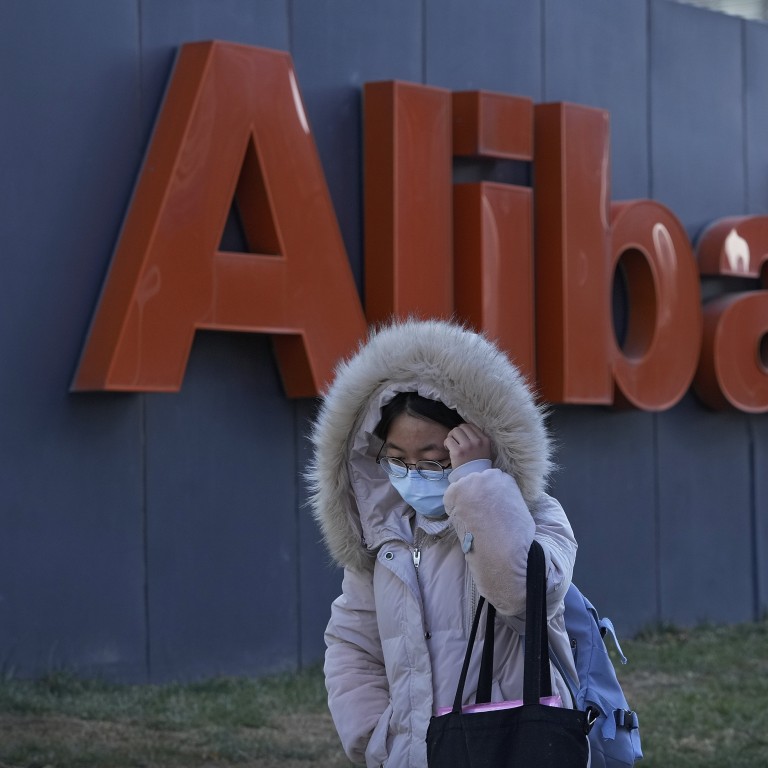
Alibaba to stick with core strategic engines of China, globalisation and tech after tough year of regulatory change
- E-commerce giant revealed that it would provide more granular financial reporting for its core commerce segment
- CEO says Alibaba will continue to focus on China consumption, globalisation and technology to drive future growth
Chinese e-commerce giant Alibaba Group Holding has reiterated its focus on three key strategic engines – China consumption, globalisation and technology – to drive future growth, as it seeks to fight off a growing list of contenders.
“Our vision for the future remains unchanged,” said Daniel Zhang Yong, chairman and chief executive of Alibaba, at the company’s Investor Day on Friday.
“We believe we are in the best of times, in the digital era today, to capture opportunities of the future with the digital and technology capabilities that we have built over the years.”
The Hangzhou-based company is eyeing lower-tier cities, high-frequency shopping and international markets for future growth after a challenging year that saw the company weather increased regulatory scrutiny and stronger competition.
The company’s stock price is currently trading at about 40 per cent of its peak price last October.
“By the end of this financial year, we are confident of achieving our target of 1 billion annual active users (AACs) in China,” said Zhang. “That will still leave us with another 200 to 300 million potential in user growth.”
Alibaba owns the South China Morning Post.
Two year-old bargain marketplace Taobao Deals and community marketplace Taocaicai – Alibaba’s two platforms aimed at lower tier cities and serving value-conscious consumers – had a combined user base of 270 million – representing year-on-year growth of 200 per cent – for the 12 months ended September, according to a company statement.
Alibaba in metaverse gaming move as Big Tech bets on potential
Local services, including food delivery service Ele.me and digital maps application Amap, incurred 11.3 billion yuan of losses while revenue climbed 18 per cent to 20.9 billion yuan in the six months ended September.
However, Ele.me saw increased purchase frequency per user, with year-on-year growth of 79 per cent in non-restaurant orders for the September quarter.
“Alibaba has multiple growth drivers in the years ahead, with its core marketplace a strong cash cow enjoying secular momentum amid a consumption upgrade in China,” said Jefferies analysts led by Thomas Chong in a recent report.
“Its highly synergistic ecosystem enables it to ramp up in lower-tier cities and local services.”
As the company continues to build a multi-engine approach to drive future growth, outgoing chief financial officer Maggie Wu revealed that it would provide more granular financial reporting for its core commerce segment, reflecting how it manages these businesses.
“We have always believed in providing more transparency in our reporting and disclosure to allow our shareholders to better understand our business and financial performance,” said Wu.
The commerce segment will be further subdivided into four segments: China Commerce, International Commerce, Local Consumer Services and Cainiao, said Wu.
For international markets, the number of annual active consumers (AACs) on Lazada, Alibaba’s Southeast Asian e-commerce platform, grew by 80 per cent in the last 18 months to 130 million.
Alibaba doubles stake in tour agency as investment pace slows
While logistics arm Cainiao’s international revenue grew by over 40 per cent in the six months ended September.
“We are devoted to serving more than 300 million consumers and achieving a gross merchandise volume of US$100 billion per year,” said Li Chun, CEO of Lazada.
The announcements came as Alibaba makes critical organisational changes, including a senior management reshuffle, appointing a new chief financial officer this month after a tough year that saw the firm hit with a US$2.8 billion antitrust fine for monopolistic practices in April.

Toby Xu, the deputy chief financial officer who joined the company in July 2018, will succeed Maggie Wu as the company’s CFO on April 1. Wu will remain a director of the board and become a member of Alibaba’s sustainable development committee.
“When you invest for the future, you often won’t see immediate financial results. But we will ensure a highly disciplined approach and are committed to providing transparency to investors about where we are investing and how these investments are performing,” said Xu on Friday.
Noting that its China commerce business was “faced with increasing levels of competition”, Xu said “we believe that offence is the best defence”.
He added that for external investments, Alibaba wants to help its existing businesses expand their scope while also “capturing future opportunities, such as the next chapter of digitalisation and … solutions for climate challenges”.
Alibaba’s Jiang back in the limelight with overseas expansion mission
For the quarter ended September 30, adjusted profit for the Hangzhou-based company was down 39 per cent to 28.52 billion, marking the first fall in adjusted profit for the company in 22 quarters.
The tech giant has also established China Digital Commerce and International Digital Commerce divisions to better deal with increased competition from JD.com, Pinduoduo and also short video platforms Douyin and Kuaishou.
The reorganisation brings together Alibaba’s overseas consumer-facing and wholesale businesses, including cross-border retail platform AliExpress, wholesale trading platform Alibaba.com and Lazada, under the leadership of Jiang Fan.
Meanwhile, China Digital Commerce combines the company’s consumer-facing and wholesale marketplaces in China and will be led by Alibaba founding member and partner Trudy Dai.



